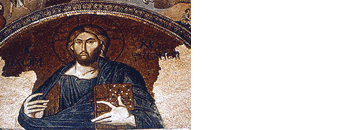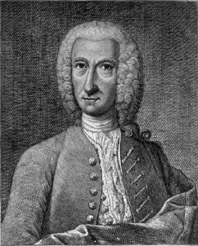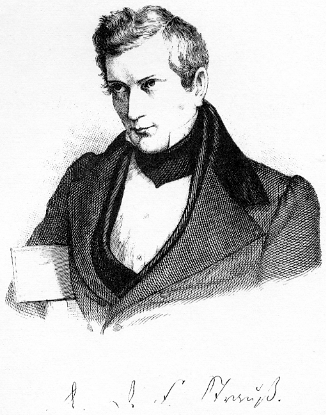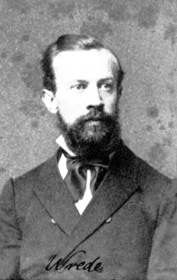
|
|
|
|
| Class
Prep |
|
|
|
Who Was Jesus? The
First Critical Questions
 The readings for today present some of the initial "probes"
made into the question of the historicity of the Jesus traditions. Hermann
Samuel Reimarus (1694–1768, right) was a professor of oriental languages in Hamburg
whose career was devoted to a defense of the religion of reason proposed by the
English deists (the religion of reason is a system of faith in human reason itself).
At the same time, however, he was exploring the reasonableness of Christian faith
as presented in the gospels. He wrote his ideas in an "Apologia or Defence
of the Rational Worshippers of God," but only circulated this among his close
friends. Seven parts of the work were published as the Wolfenbüttel Fragments
after his death by G. E. Lessing, and Lessing was hounded for the rest of his
career as a result. The excerpt you'll be reading from Reimarus, posted on ERes,
is very short; try to figure out his ideas, his assumptions, and the evidence
he presents for his conclusions. The readings for today present some of the initial "probes"
made into the question of the historicity of the Jesus traditions. Hermann
Samuel Reimarus (1694–1768, right) was a professor of oriental languages in Hamburg
whose career was devoted to a defense of the religion of reason proposed by the
English deists (the religion of reason is a system of faith in human reason itself).
At the same time, however, he was exploring the reasonableness of Christian faith
as presented in the gospels. He wrote his ideas in an "Apologia or Defence
of the Rational Worshippers of God," but only circulated this among his close
friends. Seven parts of the work were published as the Wolfenbüttel Fragments
after his death by G. E. Lessing, and Lessing was hounded for the rest of his
career as a result. The excerpt you'll be reading from Reimarus, posted on ERes,
is very short; try to figure out his ideas, his assumptions, and the evidence
he presents for his conclusions. -
 One of Reimarus' claims is that the gospels are fictions written by the disciples,
and therefore are deliberate deceptions. Our second major author for today, David
Friedrich Strauss (1808–1874, left), understood the gospels somewhat differently.
He granted that they were fictional, but understood that fiction to be of the
nature of myth rather than deliberate lie. As you read the excerpt about Strauss,
focus on the differentiation he makes between myth and history.
One of Reimarus' claims is that the gospels are fictions written by the disciples,
and therefore are deliberate deceptions. Our second major author for today, David
Friedrich Strauss (1808–1874, left), understood the gospels somewhat differently.
He granted that they were fictional, but understood that fiction to be of the
nature of myth rather than deliberate lie. As you read the excerpt about Strauss,
focus on the differentiation he makes between myth and history. -
- A
brief side-note: As you might imagine, Strauss was criticized for his ideas just
as Lessing had been attacked for publishing Reimarus' arguments. When
the government of Zurich offered him a position on its university faculty in 1839,
there was such a groundswell of protest from conservative Christians that the
government fell! The Eden-Webster Library at Webster University in
St. Louis, MO, has a
political cartoon from the time punning on Strauss' name (it means
"ostrich"): a group of people is boiling up a pot of ostrich eggs and
feeding them to the eager clergy and land-owners, who've basically eaten Strauss
alive. Notice the one clergyman who'se actually drinking his egg!
-
 The earliest post-Enlightenment probes into the historical Jesus posited
that the gospels were either deception (Reimarus) or myth (Strauss), and in either
case problematic for recovering the historical Jesus. The quest nevertheless continued
in the 19th century, with several scholars writing remarkable "lives"
of Jesus, imagining not only what his life was like but what his inner thoughts
were like as well. At the same time, scholars were becoming increasingly convinced
that the Gospel of Mark represented our earliest gospel, and that therefore it
preserved the most accurate historical account of Jesus' life. The earliest post-Enlightenment probes into the historical Jesus posited
that the gospels were either deception (Reimarus) or myth (Strauss), and in either
case problematic for recovering the historical Jesus. The quest nevertheless continued
in the 19th century, with several scholars writing remarkable "lives"
of Jesus, imagining not only what his life was like but what his inner thoughts
were like as well. At the same time, scholars were becoming increasingly convinced
that the Gospel of Mark represented our earliest gospel, and that therefore it
preserved the most accurate historical account of Jesus' life.-
- Several
scholars soon challenged this optimistic view. The first such scholar was William
Wrede (1859–1906, right); you'll be reading an excerpt from his book, The Messianic
Secret. Based on your reading:
-
-
- Define what the "messianic secret" is and where in the New Testament it is found.
- Describe what it demonstrates to Wrede's mind.
-
-
-
- Assigned Readings
-
-
| Primary: |
Excerpts from Reimarus, Strauss
and Wrede (from Dawes, The Historical Jesus Quest 73-7, 96-104, 114-20,
148-50 - Camino) |
| Secondary: |
Murphy, HJFD 47-56; online class prep |
| Lecture Slides: |
Class 2a (pdf) |
-
-
- Further Reading
-
- Räisänen, Heikki. The "Messianic Secret" in
Mark, trans. Christopher Tuckett, Studies of the New Testament and its World. Edinburgh:
T & T Clark, 1990.
-
- Schweitzer, Albert. The Mystery of the Kingdom of God: The Secret
of Jesus' Messiahship and Passion, trans. Walter Lowrie. New York:
Schocken, 1964; original 1901.
-
- --------. The Quest
of the Historical Jesus, ed. John Bowden. Minneapolis: Fortress,
2001; original 1913.
-
- Strauss,
David Friedrich. The Life of Jesus Critically Examined, ed.
P. C. Hodgson. Philadelphia: Fortress, 1972; original 1835-1836.
-
- Talbert,
Charles H., ed. Reimarus, Fragments, trans. Ralph S. Fraser,
Scholars Press Reprints and Translations. Chico, California: Scholars
Press, 1985; original, Philadelphia: Fortress, 1970.
-
- Tuckett, Christopher, ed. The Messianic Secret, Issues in Religion
and Theology 1. Philadelphia: Fortress, 1983.
-
- Wrede, William. The Messianic Secret, trans. J. C. G. Greig,
Library of Theological Translations. Cambridge: J. Clarke, 1971; original
1901.
-
-
-
- Links
-
-
-
- Sources of Photographs
-
- Reimarus: "File: H. S. Reimarus.jpg,"
originally from Alles begann mit Ansgar. Hamburgs Kirchen im Spiegel der Zeit (Hamburg: Pressestelle des Senats der Freien und Hansestadt Hamburg, 2006) 65, reproduced online at Wikimedia Commons, online, http://commons.wikimedia.org/wiki/File:H_S_Reimarus.jpg,
14 January 2003.
- Strauss: "The Life of Jesus Critically Examined by D. F. Strauss,"
Early Christian Writings, online, http://www.earlychristianwritings.com/strauss/,
14 January 2003.
- Wrede photograph: Prof. Dr. Gerd Lüdemann, "Biographien
von Mitgliedern der 'Religionsgeschichtlichen Schule' [Biographies of the Members
of the 'History of Religions' School]," Archiv "Religionsgeschichtliche
Schule," online, http://www.dwdg.de/~aoezen/Archiv_RGS/index.htm,
14 January 2003.
|
|
|
|
|
